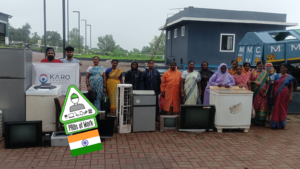 23/02/2024
23/02/2024Nestled in the heart of India, Karo Sambhav, one of the members of the WEEE Forum, is taking substantial steps to address the challenges associated with unregulated e-waste recycling within the informal sector. Amid India’s ongoing endeavors to navigate the complexities of Extended Producer Responsibility (EPR) regulations, Karo Sambhav is playing a crucial role in shaping sustainable waste management practices.
EPR Practices in India
India has developed a set of laws addressing EPR across multiple sectors to drive circular economy. Seven years after the implementation, there is now a strong need for a comprehensive approach that covers all market products and ensures fair competition and rigorous application. Recent regulatory amendments, while focusing only on recyclers and producers, have sparked discussions on the necessity of strengthening grassroots collection systems.
Presently, EPR stakeholders – producers, producer responsibility organisations (PROs), recyclers – experience uniform treatment, regardless of the depth and quality of their efforts. The absence of assessing the quality of work and robust enforcement mechanisms has led to a system where paperwork submission can be misconstrued as EPR compliance, prompting concerns such as double counting and misreporting. Moreover, a race to the bottom and very low declining compliance costs (per Kg) paid by most producers except a few, is hindering the government’s positive intent and nation’s progress towards a Circular Economy. It is critical to level the playing field amongst producers, recyclers, and PROs.
Karo Sambhav’s Mission
Founded in 2017, Karo Sambhav is on a mission to enable a circular economy and make recycling a way of life for over a billion people. With a focus on technology-enabled solutions, the organisation initially began its work with e-waste and gradually expanded its scope to encompass plastics packaging, batteries, glass, and tyre waste.
Karo Sambhav orchestrates a comprehensive ecosystem, incorporating grassroots collection networks, eco-efficient recycling systems, and the utilisation of secondary raw materials (SRM). The organisation’s innovative approach goes beyond waste management. It is catering to solving challenges on difficult waste fractions and enhancing presence in difficult geographies in India. Furthermore, Karo Sambhav is aiming to close material loops and create a marketplace for SRMs while paving the way for corresponding industries to replace virgin raw materials.
At the core of Karo Sambhav’s strategy is its proprietary technology platform—a mobile and web-based app. This digital backbone ensures transparency, traceability, and accountability throughout the waste value chain, revolutionising waste management practices in India. By digitising the entire process, from EPR compliance documents to implementation monitoring, Karo Sambhav brings ease, accountability, and transparency to every actor in the value chain.
Karo Sambhav’s impact on the Indian landscape is undeniable, with over 100 cities adopting their collection systems and managing an impressive 60,000+ tons of diverse waste categories. Renowned global corporations, including Apple, Dell, and HPE, have partnered with Karo Sambhav to transition towards circular business models.
Webinar Series
The organisation’s positive impact extends beyond waste management. Collaborations with the informal sector have facilitated trade exceeding USD 14 million, creating more than 400 job opportunities in a formal and ethical space. Karo Sambhav’s awareness initiatives utilise diverse communication channels, including on-ground engagement activities, radio, out-of-home (OOH), print, and digital media.
In the realm of knowledge dissemination, Karo Sambhav’s YouTube webinar series stands as a powerful catalyst for change. Season 2, titled “Closing Material Loops: From Waste to Renewed Resources,” has already aired five episodes. This curated platform brings together industry experts, thought leaders, and global stakeholders, fostering vital dialogues for system enhancement. Karo Sambhav’s dedication to transparency and knowledge-sharing shines through each episode, offering viewers not just information but a roadmap for action.
Karo Sambhav invites you to explore these insightful discussions, as knowledge is pivotal in driving change.
Find below the links to the season 2 of their webinar series:
- Episode 01: Exploring Pathways to Resourceful Recovery of E-waste
- Episode 02: The Crucial Role of Public Institutions in E-waste Collection
- Episode 03: How to create a Level Playing Field for CE Business Models?
- Episode 04: The Road to Effective EPR Credit Generation: Accessing Viable Approaches
- Episode 05: Uncovering the Invisible E-waste
- Episode 06: Beyond Bins- Revolutionizing E waste Collection through Strategic Partnerships
Season 1 of their webinar series, Demystifying EPR, A Key Enabler for Circular Economy, concluded in March 2023 and included 8 insightful episodes. You can revisit all the episodes from Season 1 in this YouTube Playlist.
About
The WEEE Forum a.i.s.b.l. is an international association representing 51 producer responsibility organisations across the globe. Together with our members, we are at the forefront of turning the extended producer responsibility principle into an effective electronic waste management policy approach through our combined knowledge of the technical, business and operational aspects of collection, logistics, de-pollution, processing, preparing for reuse and reporting of e-waste. Our mission is to be the world’s foremost e-waste competence centre excelling in the implementation of the circularity principle.
Transparency Register ID 702397445-73.
Copyright 2019 All Rights Reserved
Contact
BluePoint conference and
business centre
Boulevard Auguste Reyerslaan 80
B-1030 Brussels
Belgium
Newsletter
Subscribe to our mailing list to get the updates to your email inbox.